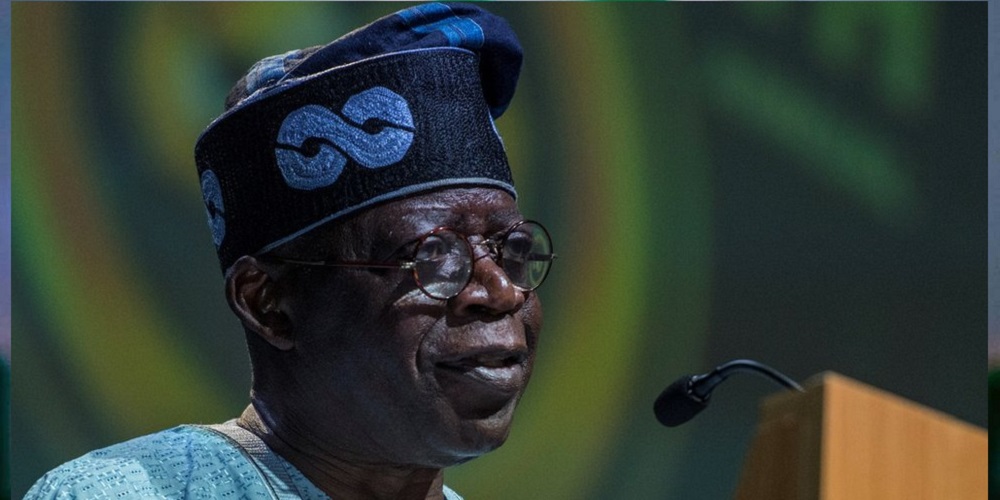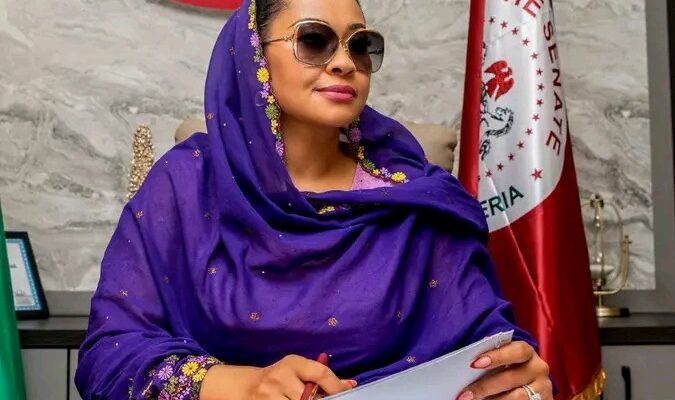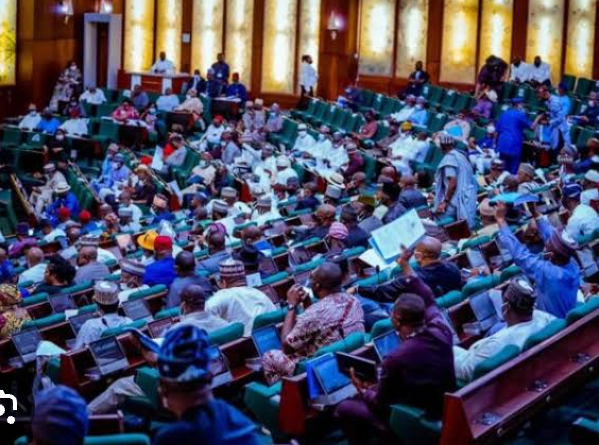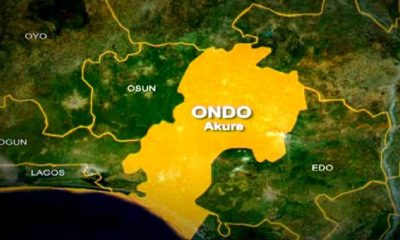News
Protest: Presidency Disowns Fake Statement Attributed To Tinubu

The Presidency has dismissed a fake statement circulating online purportedly attributed to President Bola Ahmed Tinubu.
Special Adviser to the President on Media and Publicity, Ajuri Ngelale, in a brief reaction to the circulating statement, described it as “fake” and emphasised that it did not emanate from the Presidency.
“Based on recent inquiries, I wish to reiterate that this is fake and does not emanate from the Presidency,” Ngelale said on Saturday evening.
Ngelale’s clarification comes after numerous inquiries about the authenticity of the statement, which has been widely shared on social media platforms.
The Presidency has repeatedly warned against the spread of misinformation and urged Nigerians to verify information through official channels before sharing.
The fake statement titled: “Tinubu speaks”, claimed that President Tinubu, while pleading with the planners of the impending protest for more time, announced some sweeping reforms, including a 50% slash of his salary and emoluments as well as those of top government officials.
It also claimed that President Tinubu promised the Office of the First Lady will be scrapped and presidential aircrafts will be sold off, while government ministries will be consolidated, and fuel and electricity subsidies will be restored.
News
Natasha: Court fixes June 27 for judgement on Senate’s suspension

By Francesca Hangeior
The Federal High Court sitting in Abuja, on Tuesday, slated June 27 to deliver judgement on the suit the lawmaker representing Kogi Central, Senator Natasha Akpoti-Uduaghan, filed to quash the six-month suspension that was slammed on her by the Senate.
Justice Binta Nyako okayed the matter for judgement, after all the parties adopted their final briefs of argument.
Cited as defendants in the suit marked: FHC/ABJ/CS/384/2025, are Clerk of the National Assembly, the Senate, the Senate President, Mr. Godswill Akpabio, as well as and the Chairman of Senate Committee on Ethics, Privileges, and Public Petitions, Senator Nedamwen Imasuen.
The embattled lawmaker, through her team of lawyers led by Mr. Jubril Okutekpa, SAN, urged the court to invalidate her suspension which she said was done in disobedience to a valid court order.
However, the defendants challenged the jurisdiction of the court to meddle in what they termed as an internal affair of the Senate.
More so, the defendants accused the plaintiff of breaching an order the court made on April 4, which gagged the parties from making public utterances on the matter pending before it.
The Senate President, Akpabio, through his lawyer, Mr. Kehinde Ogunwumiju, SAN, specifically drew the attention of the court to what he described as “a satirical apology” the plaintiff tendered to him on her Facebook page.
Akpabio insisted that the said apology made mockery of the order of the court.
Meanwhile, before she adjourned the matter for judgement, Justice Nyako said she would first consider the issue of contempt that was raised by the parties before deciding all the preliminary objections.
The trial judge stressed that Natasha’s suit raised “recondite issues of law” that would require judicial interpretation.
It will be recalled that Justice Nyako took over the matter following the recusal of the previous judge, Obiora Egwuatu, who had in a ruling on March 25, returned the case-file after the Senate President accused him of bias.
Justice Egwuatu had on March 4, issued an interim order that stopped the Senate Committee on Ethics, Privileges and Public Petitions from going ahead with the disciplinary proceeding that was initiated against Senator Akpoti-Uduaghan over an allegation that she flouted rules of the legislative house.
He held that the disciplinary process should be placed on hold, pending the determination of the suit that was brought before him by the embattled female lawmaker.
More so, Justice Egwuatu gave defendants in the matter, 72 hours to show cause why it should not issue an order of interlocutory injunction to stop them from probing the plaintiff for alleged misconduct, without affording her the privileges stipulated in the 1999 Constitution, as amended, the Senate Standing Order 2023, and the Legislative Houses (Powers and Privileges) Act.
The interim orders followed an ex-parte application and an affidavit of urgency that was brought before the court by the lawmaker.
However, despite the orders of the court, the Senate Committee held its sitting and suspended the plaintiff for six months.
In a subsequent ruling, Justice Egwuatu amended the interim order he issued in favour of the plaintiff by vacating the aspect that barred the Senate from undertaking any activity within the pendency of the suit.
Not long after the orders were made, the Senate President filed a motion to query the powers of the court to interfere in the affairs of the Senate.
The Kogi state federal lawmaker approached the court after she was summoned to appear before the disciplinary committee following a faceoff she had with the Senate President during plenary on February 20.
While protesting alleged arbitrary change of her seating arrangement, the lawmaker repeatedly raised a point of order to be allowed to speak, even though she had been overruled by the Senate President.
Irked by her conduct, the Senate President referred her case to the Ethics Committee.
In a television interview she granted on February 28, Senator Akpoti-Uduaghan alleged that her troubles in the Senate began after she rejected unwanted advances from the Senate President, Akpabio.
In an ex-parte application she brought before the court, the lawmaker applied for an order to declare any action the Committee would take within the pendency of her suit, as, “null, void, and of no effect.”
Specifically, the court, in the interim orders it made on Tuesday, held: “It is hereby ordered as follows: An order of this Honourbale Court is made granting leave to the Plaintiff/Applicant to serve the 2nd – 4th Defendants/Respondents with the Originating Summons and all other accompanying processes in this Suit by substituted means, to wit: by serving same through the 1st Defendant (Clerk of the National Assembly) or pasting same on the premises of the National Assembly and publishing same in two national dailies.
“An Order of Interim Injuction of this Honourable Court is made restraining the 2nd Defendant/Defendant’s Committee on Ethics, Privileges, and Code of Conduct, headed by the 4th Defendant, from proceeding with the purported investigation against the Plaintiff/Applicant for alleged misconduct, sequel to the events that occurred at the plenary of the 2nd Defendant on the 20th day of February 2025, pursuant to the referral by the 2nd Defendant on the 25th of February 2025, pending the hearing and determination of the Motion on Notice for interlocutory injunction.
As well as, “An order of this Honourable Court is made directing the 1st – 4th Defendants to show cause within 72 hours upon the service of this order on them, why an order of interlocutory injunction should not be granted against them, restraining them from proceeding with the purported investigation against the Plaintiff for alleged misconduct without affording her privileges as stipulated in the Constitution of the Federal Republic of Nigeria 1999 (As Amended), the Senate Standing Order 2023, and the Legislative Houses (Powers and Privileges) Act.”
News
Saudi company to invest $20bn in AI in US amid Trump’s visit

By Francesca Hangeior
A Saudi company will invest $20 billion in artificial intelligence-related sites in the United States, the White House said Tuesday, as the oil-rich kingdom seeks a leading role in the technology.
Saudi firm DataVolt “is moving forward with plans to invest $20 billion in AI data centres and energy infrastructure in the United States”, the White House said in a statement as President Donald Trump paid a state visit to Riyadh.
News
Reps reject bill on rotational presidency among six geopolitical zones

By Francesca Hangeior
Members of the House of Representatives has rejected a constitutional amendment bill seeking to rotate the office of the president and vice president among the six geopolitics zones of the country.
In addition, the House rejected six other constitutional alteration bills listed in the order paper of the House for consideration.
It, however, resolved to bring back the bills on Wednesday and consider them on their individual merit.
The House had at the commencement of debate set aside its rules to allow it take the constitutional alteration bills simultaneously, while allowing members to choose any of the seven listed on which they wish to debate on.
However, most members chose the bill seeking to rotate the office of the President and Vice President among the six geopolitical zones, with many members opposing the idea and warning against setting a dangerous precedent with it.
Deputy Minority Leader, Aliyu Sani Madaki led the opposition to the bill, saying that issues the bill intend to cure has been addressed by the Federal Character Commission, warning that the issue of rotation should not be included in the constitution, but allowed to remain the way it is.
Madaki argued that the existing political parties already have mechanism to ensure fair representation in the sharing of offices at every given electoral period.
Sada Soli (APC, Katsina) described the proposed alteration as ingenuous, but wondered whether it will work against the issue of quality.
He stressed that adopting the rotation principle will not be in the interest of the country as it will promote regional and ethnic rivalry among the various zones of the country.
Shina Oyedeji (PDP, Oyo) said if the rotational principle is included in the constitution, every state and tribe in the various zones will begin another round of agitation for fairness and justice.
He believe that everybody in the country should be given equal opportunity to aspire to the office of the President and Vice President, saying “if you adopt zoning and it’s comes to the South West for example, which state will take the position? Is it Ogun or Oyo.
Bello Mohammed ElRufai wondered what will happen if the President dies while in office like it happened when former President Umaru Musa Yar’adua died in office, saying will you ask the Vice President to vacate office to pave the way for another President from that zone?
ElRufai argued that adopting the provision will also infringe on the right of all Nigerians to contest for any office of their choice, adding that even if the rotation principle is allowed, there will always be mistrust among the people.
He said “whatever you do in Nigeria, there will always be a cry of marginalisation. We should not engage in a dangerous precedent by putting it in the Constitution”.
Olumide Osoba (APC, Ogun) said even though the amendment might be a unique one, it will be out of place to force the political parties on where to choose their candidates during elections.
However, Minority Whip, Ali Is a said the six geopolitical zones should be allowed to have a shut at the Presidency and also extended to the state level so that governorship is rotated among the three senatorial zones.
He argued that all geopolitical zones in the country have well qualified persons who can manage the affairs of the country and even the West African subregion, adding that even the Federal Character principle provides that there should be fairness among all states of the country.
He commended the Deputy Speaker for acknowledging the fact that there is the need to allow fairness, saying “in 2027, we should allow the Presidency go to the North East for the sake of fairness and allow all zones to produce the President”.
Clement Jimbo (APC, Akwa Ibom) said the bill seeks to cure the age long injustice metted on the minority groups in the country, adding that a proviso be included in the Constitution that will ensure that after all zones has had a shut at the Presidency, the principal be brought to an end.
The bills are a bll for an Act to Alter the Constitution of the Federal Republic of Nigeria, 1999 to remove from Independent National Electoral Commission, the Powers of Registration and Regulation of political Parties in Nigeria and Transfer same to the Office of the Registrar General of Political Parties, and a Bill for an Act to Alter the Constitution of the Federal Republic of Nigeria, Cap. C23, Laws of the Federation of Nigeria, 2004 to Provide for the Principle of Rotation of the Offices of the President and the Vice President of the Federal Republic of Nigeria among the Six Geopolitical Zones of the Country, Namely: North Central, North East, North West, South East, South South, and South West.
Others are Bill for an Act to Alter the Constitution of the Federal Republic of Nigeria, Cap. C23, Laws of the Federation of Nigeria, 2004 to provide for Establishment, Independence, and Functions of the Office of the State Auditors-General for Local Governments and the Federal Capital Territory Area Councils, to Strengthen Fiscal Oversight, Promote Accountability and enhance Good Governance at the Grassroots and a bill for an Act to Alter the Provisions of the Constitution of the Federal Republic of Nigeria, 1999 to Create Ughelli East Local Government Area in Delta State.
The bills also include a ill for an Act to Alter the Constitution of the Federal Republic of Nigeria, Cap. C23, Laws of the Federation of Nigeria, 2004 to provide for the Number of Judges of the Federal High Court to be not less than one hundred or such other Number as may be prescribed by an Act of the National Assembly, Bill for an Act to Alter the Constitution of the Federal Republic of Nigeria, Cap. C23, Laws of the Federation of Nigeria, 2004 to expand the jurisdiction of the Federal High Court to include Admiralty Jurisdiction, including Shipping and Navigation on the River Niger, River Benue and their effluents, and on such other Inland Waterways as may be designated by an Act of the National Assembly as International Waterways, all Federal Ports, and Carriage by Sea.
There is also the Bill for an Act to Alter the Provisions of the Constitution of the Federal Republic of Nigeria, 1999 to Empower the National Judicial Council to Fix and Review, in conjunction with the National Salaries, Incomes and Wages Commission, the Salaries, Allowances, and other Emoluments of Judicial Officers and Staff of the Judiciary.
-

 News24 hours ago
News24 hours agoGo home to face corruption probe, protesters in London tell Kyari (Photos)
-

 News2 hours ago
News2 hours agoJust in: Another major headache as 3 PDP senators defect to APC
-

 News20 hours ago
News20 hours agoUK unions slam Govt’s decision to end care worker visas
-

 News11 hours ago
News11 hours ago2nd Anniversary: Tinubu to commission Abuja International Conference Centre – Wike
-

 News10 hours ago
News10 hours agoUS revokes governor’s visa
-

 News19 hours ago
News19 hours agoSAD! Woman, child electrocuted in Edo
-

 Metro10 hours ago
Metro10 hours agoTension in Ondo community as herdsman dies in clash with vigilance group
-

 News10 hours ago
News10 hours agoTaraba Woos Global Investors Ahead of Landmark Economic Summit






